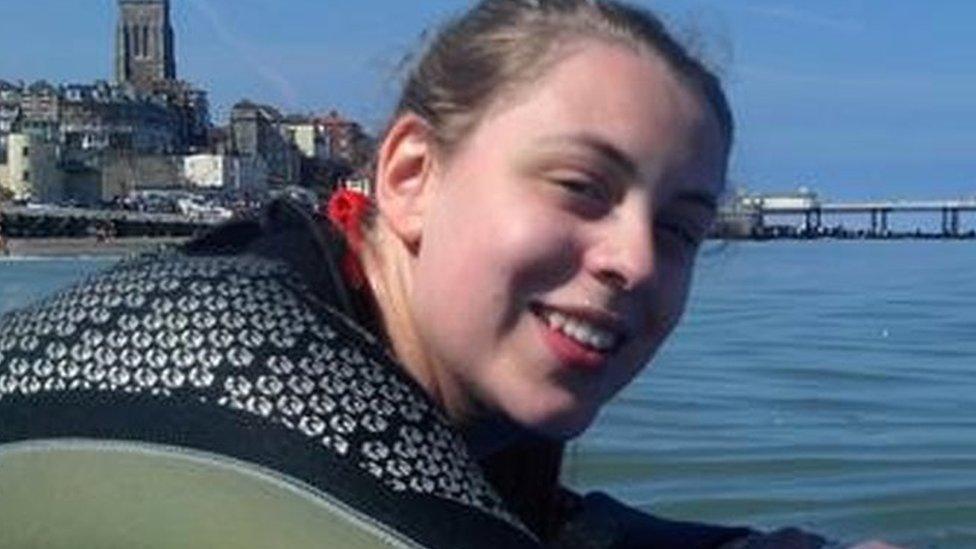'I did not send my child to university to die'
- Published

Romy Ulvestad died at home during a Covid lockdown
University of Edinburgh student Romy Ulvestad died at her parents' London home four days after her 21st birthday.
She had killed herself after staff failed to provide additional support, despite repeated warnings that she was struggling with her mental health.
Now her mother is adding her support to a campaign for the UK government to create legal duty of care for students.
The university, which apologised for failing Romy, said it had improved the support it offers since her death.
Libby Kitson, Romy's mother, has joined calls for Westminster to change the law to better protect students, and hopes the Scottish government will follow suit.
The petition to the UK government, external is being supported by 25 bereaved families, who have come together and set up The LEARN Network, external.
It reached more than 127,000 signatures before the deadline at midnight on Mothers' Day, meaning Parliament will consider the subject for debate.
Speaking to BBC Scotland, Ms Kitson said she did not know that her daughter was struggling with her mental health when she returned to London during the Covid lockdown in 2020.
"Her father and I had no idea about her mental health struggles but they had been well-flagged to people at the University of Edinburgh who could have done something about it," she said.
"I sent Romy to off to university to study classics, which would be a pivotal point for the rest of her life. What I didn't expect to do was send her off to university to die."
'Legal duty of care'
Romy, a classics student and part-time model, died in April 2020, more than a year after she communicated with the university about her struggles by requesting a "special circumstances" application to resit her exams without penalty.
Ms Kitson said: "We want there to be a legal duty of care within all higher education institutions, and I think some people, including our government, seem to think there is some legal requirement in place but there really isn't.
"You want to know that if your child is suffering with any kind of mental health issues, or is overwhelmed by university life, there are people there who are trained and skilled to help deal with it.
"And if they really, really are in a state of crisis you would want to be informed."

Libby Kitson hopes the Scottish government will legislate after the UK government
Campaigners from ForThe100 want a change in law to ensure higher education institutions have a legal duty of care towards their students, as schools already do.
The Department of Education has said creating a legally enforced duty of care "would be a disproportionate response".
Ms Kitson said the campaign was not looking to provide a means for families to sue universities, but to prevent similar deaths.
She said she did not want any other parent to have to go through the same situation.
"We would hope that the Scottish Parliament would look at England and Wales and think 'they've led by example, we should follow suit'," she said.
"A Scottish student's life is no less important."
'Deeply sorry'
A University of Edinburgh spokeswoman said it had been "shocked and deeply saddened by what happened" to Romy and "deeply sorry" for the gaps in support given to her.
"Supporting our students' mental health and ensuring their wellbeing is our absolute priority," she said. "Our support policies and practices are under regular review as we continue to focus and improve upon our mental health support provision and provide the best possible environment for our students."
Students at the university now have access to a "named-contact relationship" with staff trained in wellbeing and mental health, alongside other support services.
The spokeswoman added: "We continue to engage with students through both the Students' Association and the Sports Union to identify how best we can shape and develop our services to support students most effectively.
"We work closely with the three other universities in Edinburgh and NHS mental health colleagues to improve pathways into specialist mental health services for students."
'Disproportionate response'
The Department for Education previously responded to the petition by saying that higher education providers already had a "general duty of care not to cause harm to their students through their own actions".
A spokesperson said: "We acknowledge the profound and lasting impact a young person's suicide has upon their family and friends, and know among the petitioners there are those who have personal experience of these devastating, tragic events.
"[However] we... feel further legislation to create a statutory duty of care, where such a duty already exists, would be a disproportionate response."
In a response to the petition, the Scottish government said: ''We are determined to support the mental health of all students. Over the last three years we have invested £11.5m to introduce additional counsellors in colleges and universities''.
- Published16 March 2023

- Published6 October 2022

- Published25 June 2018
